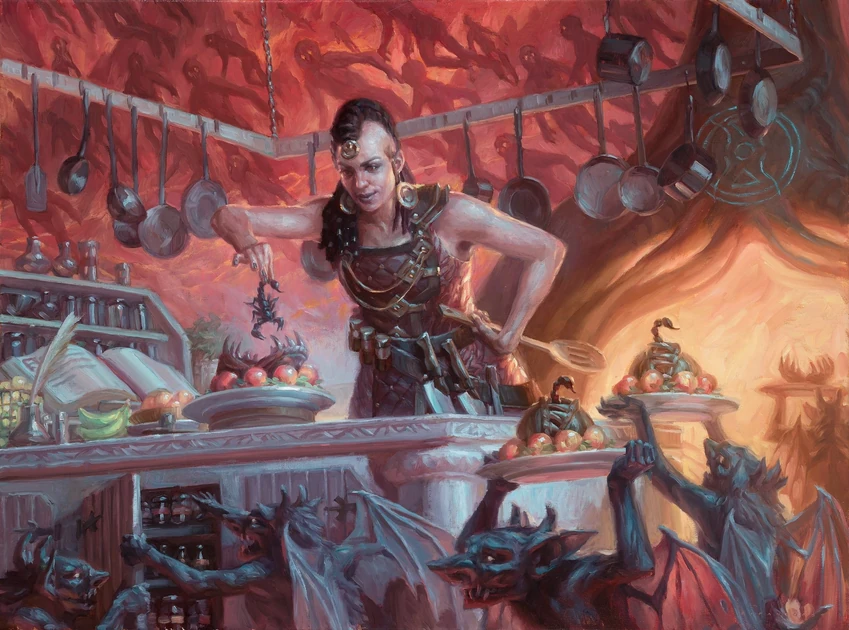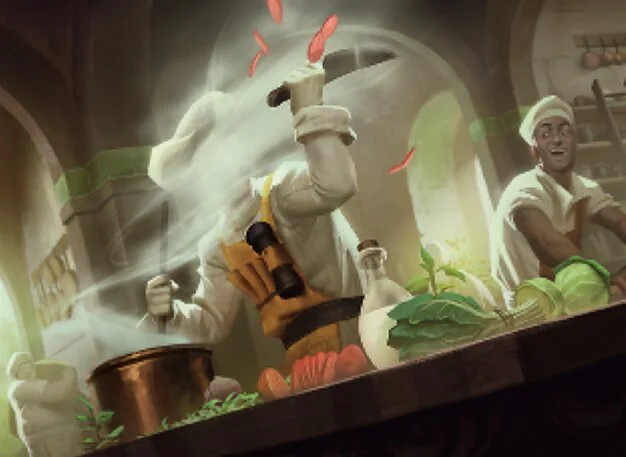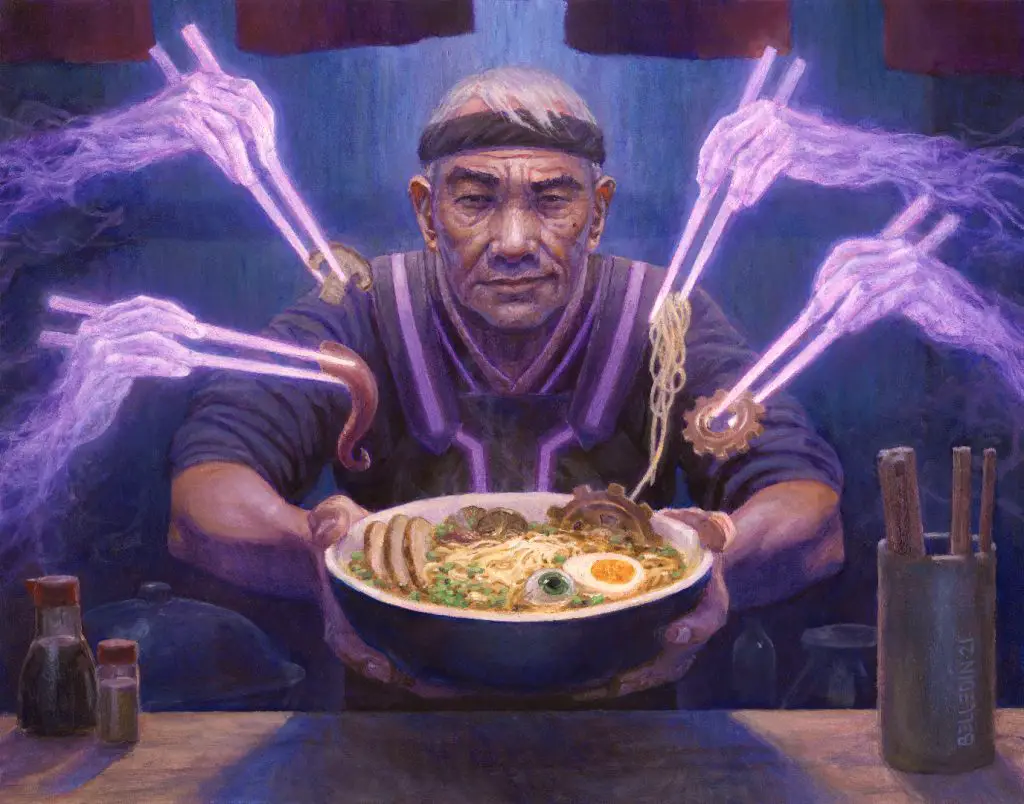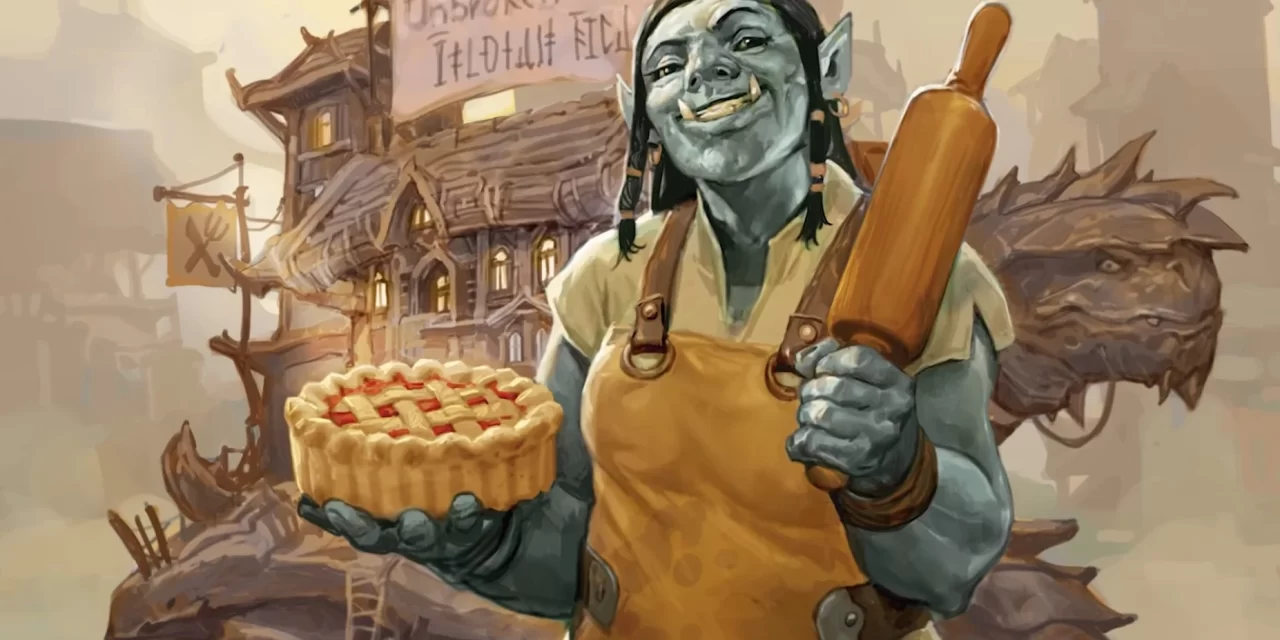Whether you want to be the next Iron Chef or just want to add some spice to your D&D game, you might consider the Chef feat.
After all, there’s nothing quite like the comforts of a well-cooked meal to invigorate any adventurer’s soul!
So, grab your cooking utensils, put on your apron, and start chopping those veggies.
Today we’re talking about the Chef feat in D&D 5e!
What is the Chef feat?
The Chef feat can be found in the excellent Tasha’s Cauldron of Everything book.
Even beyond the flavor of being a culinary master, there are some mechanical benefits to taking the Chef feat.
Specifically:
- Ability Score: Increase your Constitution or Wisdom score by 1 (to a maximum of 20).
- Tool Proficiency: Gain proficiency with cook’s utensils if you don’t already have it.
- Short Rest: Prepare food for a number of creatures equal to 4 + your proficiency bonus. Creatures who eat the food and spend Hit Dice to recover hit points gain an extra 1d8 hit points.
- Long Rest: Make a number of treats equal to your proficiency bonus. The treats last for 8 hours. A creature can eat one as a bonus action to gain temporary hit points equal to your proficiency bonus.
Not bad, right?
You get several benefits for the price of one feat. Of course, these are particularly handy as a way to offer more support to your party.
But let’s dive a bit deeper.

How Does the Chef Feat Work in 5e?
The first benefits are straightforward.
You get a +1 bump to either your Constitution or Wisdom ability score. Additionally, you gain proficiency with cook’s utensils if you aren’t already getting it from some other source.
Where the Chef feat really stands out are the last two benefits.
Your party is likely taking at least one short rest per adventuring day. So, you can use that opportunity to whip up some quick snacks!
Short rests are most often used to spend Hit Dice to recover hit points. Not to mention certain resources like Warlocks’ spell slots or Monks’ ki points.
So, you can make snacks for a number of creatures equal to 4 + your proficiency bonus. As you level up, your proficiency bonus will increase, which means you’ll be able to make more snacks.
(The table below will show you what your proficiency bonus is per level.)
In addition to the hit points that you and your allies who eat the snacks recover with Hit Dice, they’ll also be recovering an extra 1d8 hit points on top of that. This allows the party to stretch their pool of Hit Dice even further.
Related: Using Hit Dice in D&D 5e Explained
| Character Level | Proficiency Bonus |
| 1-4 | +2 |
| 5-8 | +3 |
| 9-12 | +4 |
| 13-16 | +5 |
| 17+ | +6 |
If you spend one hour of work OR finish a long rest, you can make a different type of treat instead. The number of these treats that you make depends on your proficiency bonus.
When you or another creature uses a bonus action to eat the treat, they gain temporary hit points equal to your proficiency bonus.
Just make sure that nobody decides to be a pig and start eating them all.
Remember: temporary hit points don’t stack!
Related: Temporary Hit Points in D&D 5e Explained

Which Classes Make the Best Chef?
Some classes in D&D 5e might have use of the Chef feat and be able to bring some skill to the kitchen.
Artificers are unique candidates for the Chef feat. Extra constitution is handy for maintaining concentration which will help them get more use out of their spells. Thematically, it could also work well with an Alchemist Artificer.
Barbarians can always use more Constitution and temporary hit points for soaking up damage. Plus, I love the idea of a character that has full-on Gordon Ramsay meltdowns in the kitchen as well as in combat.
Bards are excellent support characters and the Chef feat can be paired nicely with their Song of Rest when spending Hit Dice.
Clerics are also great for buffing and supporting their party. They’ll get plenty of use out of either Constitution or Wisdom increase. They’re probably the best option for taking the Chef feat.
Druids already tend to keep goodberries handy, but they can be excellent cooks as well. Both the Constitution and Wisdom score increases are useful for Druids which makes them a good candidate for the Chef feat.
Paladins are probably the best to keep a pocket full of snacks. They will usually have their bonus action available to them and the temporary hit points from treats are helpful on the front lines.
Rangers are a decent option for the Chef feat. Either ability boost is helpful and the feat can play well to a kind of “survival cooking” element.
Get Out Of the Kitchen!
One of the biggest rules when working in a kitchen is “if you’re not helping, you’re just in the way.” Honoring that sacred rule, there are a few classes that I think are best kept out of the kitchen.
Fighters have a fairly high demand for their bonus action which makes it tough for them to take a snack break during the fight. However, either ability score increase can be helpful for Fighters. It’s a “maybe” from me here.
Monks could make for good Chefs, but using their bonus action to snack is a pretty big sacrifice. Both ability score increases are handy for Monks, but I wouldn’t recommend going out of your way to get the Chef feat. Focus on building your Dexterity, Wisdom, and Constitution first and foremost.
Rogues have way more important matters to focus on. Neither ability boost specifically helps them much and their bonus action tends to be firmly spoken for.
Sorcerers, Warlocks, and Wizards really need to focus on other feats that actually better fit their role as spellcasters. Maybe they can light the fire, but leave the cooking to someone else.
Recommended: Complete Guide to Feats in D&D 5e + Favorite Options

How Each Class in D&D 5e Might Be as a Chef
As a bit of humor, I got to thinking about how each of the classes in 5e might approach the culinary arts.
As regular readers will know, I’m big on the roleplaying part of D&D. Being a talented chef should ABSOLUTELY find its way into your character’s personality or other aspects of your roleplaying.
Make your own recipes and cooking style within your own game. But perhaps these can give you some inspiration!
| Class | Celebrity Chef | Signature Dish | Thoughts |
| Artificer | Alton Brown | Scientifically Perfect Chewy Chocolate Chip Cookies | Highly intelligent food nerd using the best equipment possible. |
| Barbarian | Gordon Ramsey | Barbecue Baby Back Ribs | The secret ingredient is RAGE! |
| Bard | Rachael Ray | Truffle Risotto | Charming presentation that delights audiences and their taste buds! |
| Cleric | Julia Child | Beef Bourguignon and French Onion soup | The purest and most wholesome foods and techniques with a focus on shared dishes. |
| Druid | Ina Garten | Salad Niçoise (alternatively, a fresh tabbouleh) | Wholesome and fresh ingredients for a meal that satisfies your stomach and soul. |
| Fighter | Bobby Flay | Bacon-wrapped pork tenderloin | Expert grilling technique with a focus on efficiency and flavor. |
| Monk | Jiro Ono | Tuna Akami | A highly skilled and disciplined classical technique perfected over many years. |
| Paladin | Robert Irvine | Stuffed Chicken with a Marsala sauce | Strength + Charisma combining bold flavors with top-notch presentation. |
| Ranger | Wolfgang Puck | Herb-crusted Prime Rib Roast | Wide assortment of exotic ingredients to create new and signature fusions of cuisines. |
| Rogue | Guy Fieri | 12 Spice Chili | Flashy and stylish cuisine that “does its own thing” |
| Sorcerer | Antoni Porowski | Queso Fundido with a grilled vegetable and arepas spread | Untrained natural cooking talent. |
| Warlock | Anthony Bourdain | Cassoulet | Unorthodox and unique style but excellent quality. |
| Wizard | Emeril Lagasse | Swordfish in seasoned tomato sauce and a banana cream pie dessert | Flambé? BAM! |
Is The Chef Feat Good?
The Chef feat is best considered for a character that can use the boost to either their Wisdom or Constitution score.
Being able to make some snacks to help the party stretch their Hit Dice on a short rest can be helpful. However, you can get a similar effect by asking your party’s Bard to play their Song of Rest.
Meanwhile, the temporary hit points provided by your treats can be helpful.
However, it can be tough to use a bonus action to eat one in combat for most characters. They’re typically best eaten before a fight starts.
While these temporary hit points are handy to have, it’s only a small buff.
Generally speaking, the Chef feat is something that you take to add more flavor to your character. It can be a fun roleplaying device, but it’s not likely to help you build a more “efficient” character.
I would personally consider giving this feat for free to a character whose background is a chef. (Assuming, of course, that everyone is getting some kind of free “flavor” feat.)
While it’s fun and adds a lot to a character, it’s tough to justify taking this over other feats or an Ability Score Increase.
Of course, if you REALLY want to impress your party, there is one other option…
I’m not saying that making snacks for your game night is going to get you free inspiration or other benefits.
But I’m also not not saying that…
Conclusion – The Chef Feat in D&D 5e
The Chef feat is certainly one of the most interesting feat options in D&D 5e. I’ve gotten several requests to talk about it and offer my two cents, so I hope this helps!
There aren’t many feats that are similar to the Chef feat.
I do like that it can bring out a unique level of “realness” in an adventure by adding a mechanical incentive.
After all, it’s rare that games will pay much attention to when/what the party is eating except in a more survival-based adventure!
So maybe your trek through the jungle sees the party eating insects to survive. At least the Chef can make sure that they’re GOURMET bugs!
And, hey, since you’re the one who did the cooking, let the rest of the party worry about the cleanup!










